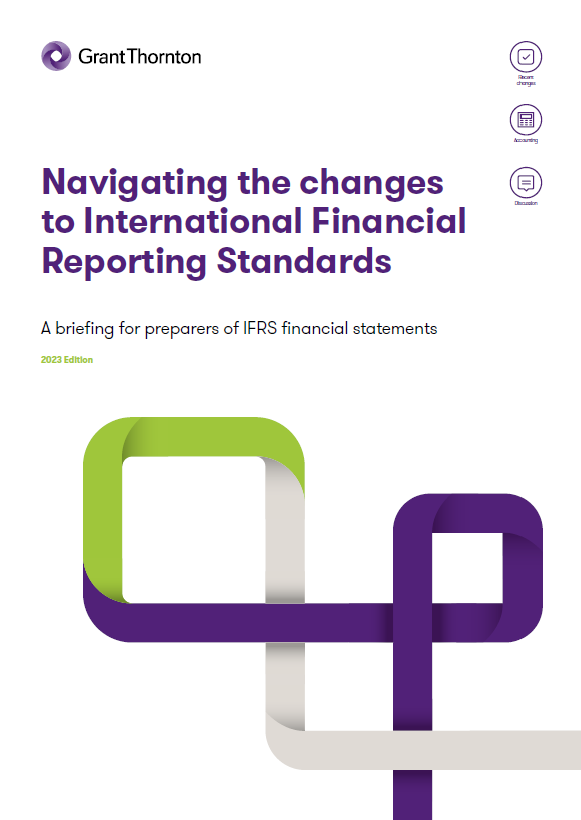-
Audit methodology
At Grant Thornton, we use a single audit methodology across our global network. This means that our clients gain the same proven, high-quality approach wherever they are.

-
Financial statements and consolidated financial statements
Preparation of monthly, quarterly or annual report and consolidated report on the basis of information presented by the client.
-
Financial Accounting
Effective bookkeeping and financial accounting are essential to the success of forward-thinking organisations. To get the optimum benefit from this part of your business, you'll need an experienced team behind you.
-
Tax compliance
Tax is likely to have an impact on almost every business decision you make. Whatever your business’s specific needs, we respond quickly and devise solutions tailored to you. We perform VAT, income tax, social tax and other tax accounting as well as present tax declarations to the tax authorities.
-
Chief financial officer service
Chief Financial Officer services include the periodic reporting, information systems standardization, internal document management and information flow optimization, budget preparation, cost accounting, cash flow and working capital management, financial analysis, investment return evaluation for managers.

-
International taxation
Grant Thornton operations in the Baltic States give us an access to the international expertise and allow advising the client on the minimisation of tax risks arising from conducting business in a foreign tax jurisdiction. We also consult foreign investors in finding an optimum group structure and form of enterprises in Lithuania and other Baltic States.
-
Transfer pricing
We advise the management bodies of local and multinational groups of companies in issues concerning transfer pricing of intra-group transactions and, if necessary, in the preparation of the relevant compliance documents. We also assist in preparing transfer pricing policies in order that future transactions are priced in accordance with the local as well as international regulations.
-
VAT refunds
We advise foreign clients in issues concerning the refund of value added tax paid in Lithuania, and Lithuanian clients – in the refund of value added tax paid in the EU member states. If necessary, we carry out these procedures on behalf of the client.
-
Profit tax, tax incentives
Our tax advisory department consults local and international clients in both everyday and specific taxation issues related to business activities.
-
Due diligence
Making the right investment decision can have a significant impact on shareholder value. To make an informed investment decision and create the best value from the transaction you will need the following an understanding of the target business identification and understanding of key business drivers an understanding of all the relevant issues clear analysis, conclusions and recommendations.
-
Assistance and representation during tax investigations, inspections, disputes
We provide services for registration in the Register of Taxpayers and the Register of VAT Payers. We represent clients' interests in tax disputes at the State Tax Inspectorate, Tax Disputes Commission, courts and other institutions.

-
Legal advisory for business start
We assist to quickly establish a company, branch or permanent establishment in Lithuania, open a bank account, VAT registration and obtain all necessary licenses for activity.
-
Legal advisory for business development
Our team has gained the greatest experience in advising international companies on the management of groups of companies. We advise and implement reorganizations or liquidations. Together with a team of tax and financial advisors, we perform a comprehensive due diligence (tax, legal & financial).
-
Labor law for CEOs and employees
We provide modern labor law solutions for the CEO, C-level managers and employees, which are tailored specifically to your business industry. We will take care of well-judged employment contracts and benefits package, protection of confidential information and non-compete agreements, handling of employee data or stock option rules, posting of employees, employment of EU and third-country nationals, organization of telework.
-
Fintech
With extensive experience in money laundering prevention and compliance and a strong team of financial experts, we advise clients on financial services, electronic money, licensing of payment institutions, capital formation, listing of mutual lending platform operators and other operational issues.
-
Migration and relocation
We assist you, your family members and employees of the organization to obtain national and European Union (Schengen) visas, residence permits, e-resident status, provide mediation letters and ensure a smooth relocation to Lithuania.
-
Due diligence
Making the right investment decision can have a significant impact on shareholder value. To make an informed investment decision and create the best value from the transaction you will need the following an understanding of the target business identification and understanding of key business drivers an understanding of all the relevant issues clear analysis, conclusions and recommendations.
-
Fintech advisory
The rapidly changing world and evolving technology are driving the development of new business models such as acting as a payment institution, a provider of virtual currency services and a financial institution. Grant Thornton Baltic provides support and advice to these companies.
-
Corporate finance management
Building a successful business requires a clear vision backed by a focused strategy. To achieve this vision, businesses must negotiate an increasingly complex environment.
-
Business Valuations
Choosing the right valuation method is the most important element in the process of estimating the fair value of a business as it must be adequate in terms of the purpose and object of the valuation. Grant Thornton uses only proven and generally accepted methods from among the wide range of income, asset and market approaches. Having conducted a preliminary analysis of the object and purpose of the valuation, we identify the method that will be the most appropriate considering the situation and characteristics of a given enterprise and the business sector in which it operates. Prior to commencing valuation, we also identify the documents necessary in the process.
-
Mergers and acquisitions
We provide advice to clients in all material aspects of the process of conducting transactions: finding a candidate for buyer, purchase or merger, initial analysis and valuation, negotiations, due diligence, structuring transaction price, preparing legal documentation and formal closing of the transaction. We also provide consultation for management buyouts.
-
Protection of Interests of Bondholders'
Grant Thornton provides bondholders' advocacy and protection services. We have resources, knowledge and the latest technology. Defending the interests of bondholders · Representing the interests of bondholders
-
External Financial Management Services
Providing an external financial management services makes it possible to manage a company’s finance on a day-to-day basis by a competent economist, without the need of offering full-time employment. By cooperating with experts on managing big-budget projects, we provide our clients with excellent support in comprehensive management of company’s finance.
-
Training
Financial Management Training and Seminars. Our experts have significant regional competence and close co-operation with our global colleagues. They happily share their expertise with our clients.

-
Internal Audit Services for Financial Sector Companies Licensed in Lithuania
Internal audit services adapted to Lithuanian financial sector companies ensure compliance with regulatory acts, risk management and operational excellence.
-
Internal Audit Services for EU/Foreign Aid Projects
Internal audit for EU/foreign aid fund projects helps to ensure compliance of activities and related costs with requirements.
-
Internal Audit for the Companies Certified by ISO
Internal auditing ensures ISO standard compliance, evaluates management system effectiveness, and gathers objective evidence of performance.
At Grant Thornton Baltic UAB (hereinafter referred to as “Grant Thornton” or “we”) we value privacy and personal data protection and follow the principles of data processing set out in this privacy policy. We consider integrity and confidentiality of personal data of utmost importance and guarantee lawfulness of personal data processing. The privacy policy explains how we collect and use personal data including our website, www.grantthornton.lt.
1. Terms and definitions
1.1. Personal data – means any information relating to an identified or identifiable natural person ('data subject'); an identifiable natural person is one who can be identified, directly or indirectly, in particular by reference to an identifier such as a name, an identification number, location data, an online identifier or to one or more factors specific to the physical, physiological, genetic, mental, economic, cultural or social identity of that natural person;
1.2. Processing of personal data – means any operation or set of operations which is performed on personal data or on sets of personal data, whether or not by automated means, such as collection, recording, organisation, structuring, storage, adaptation or alteration, retrieval, consultation, use, disclosure by transmission, dissemination or otherwise making available, alignment or combination, restriction, erasure or destruction;
1.3. Controller – means the natural or legal person, public authority, agency or other body which, alone or jointly with others, determines the purposes and means of the processing of personal data; where the purposes and means of such processing are determined by Union or Member State law, the controller or the specific criteria for its nomination may be provided for by Union or Member State law;
1.4. Processor - means a natural or legal person, public authority, agency or other body which processes personal data on behalf of the controller;
1.5. Third party – means a natural or legal person, public authority, agency or body other than the data subject, controller, processor and persons who, under the direct authority of the controller or processor, are authorised to process personal data;
1.6. Personal data breach – means a breach of security leading to the accidental or unlawful destruction, loss, alteration, unauthorised disclosure of, or access to, personal data transmitted, stored or otherwise processed;
1.7. Data subject – person whose personal data is processed (e.g. client who is a natural person, website user or a contact person of a legal entity client).
1.8. GDPR – Regulation (EU) 2016/679 of the European Parliament and of the Council of 27 April 2016 on the protection of natural persons with regard to the processing of personal data and on the free movement of such data, and repealing Directive 95/46/EC (General Data Protection Regulation).
2. Principles
2.1. Grant Thornton and the processors working for us process person data adhering to following principles:
2.1.1. lawfulness, fairness and transparency – the processing is lawful, fair and transparent to the data subject;
2.1.2. purpose limitation – collected for specified, explicit and legitimate purposes and not further processed in a manner that is incompatible with those purposes;
2.1.3. data minimisation – adequate, relevant and limited to what is necessary in relation to the purposes for which they are processed;
2.1.4. accuracy – the personal data is accurate and up to date; we employ all reasonable measures to ensure that inaccurate personal data is deleted or corrected;
2.1.5. storage limitation – kept in a form which permits identification of data subjects for no longer than is necessary for the purposes for which the personal data are processed;
2.1.6. integrity and confidentiality – processed in a manner that ensures appropriate security of the personal data, including protection against unauthorised or unlawful processing and against accidental loss, destruction or damage, using appropriate technical or organisational measures.
3. Security of processing
3.1. Grant Thornton applies necessary, and appropriate to a risk, organisational, physical and technological measures to protect personal data. These measures include rules and procedures for employees, for managing data and IT infrastructure, internal and external networks and also protecting all the equipment and the building of Grant Thornton.
3.2. Grant Thornton has provided relevant training to all employees processing personal data.
3.3. Grant Thornton may use processors to process personal data, we ensure that all our processors process personal data in accordance with our instructions, applicable law and employing all appropriate organisational and technological security measures.
4. Lawful basis of processing
4.1. Grant Thornton processes personal data to ensure performance of a contract (including a contract with clients - data controllers), to comply with legal obligations, out of legitimate interest, or on the basis of data subject’s consent.
4.1.1. We process personal data to ensure performance of a contract is used when we have concluded a contract and the contractual aim is not achievable without processing personal data.
4.1.2. Legal obligations of processing includes all personal data processing under relevant laws and regulations for example Labour Code of the Republic of Lithuania, The Republic of Lithuania Law on the Prevention of Money Laundering and Terrorist Financing, The Republic of Lithuania Law on the Audit of Financial Statements, The Republic of Lithuania Accounting Law, The Republic of Lithuania Law on Companies, The Civil Code of the Republic of Lithuania and other.
4.1.3. We process personal data on grounds of legitimate interest to improve the quality of our services and for the purpose of business development. We ensure that our legitimate interest doesn’t breach data subjects’ fundamental freedoms and rights.
4.1.4. When processing personal data with consent as lawful basis we only process specifically what data subject has consented to. The consent is freely given, specific and informed. Data subject can take back consent at any given time and as easily taken back as it was given.
5. Data controller or data processor and collection of data
5.1. Grant Thornton can be a controller or a processor in various data processing operations. To ensure data subjects privacy rights Grant Thornton abides by confidentiality principles and strictly limits disclosure of personal data.
5.2. Only the persons authorised by Grant Thornton have the right to modify and process personal data.
5.3. Grant Thornton processes personal data received directly from the data subject (i.e. person who submitted the personal data) or indirectly (through corporate clients).
6. Types of personal data
Grant Thornton, clients, employees, representatives, participants, members of bodies, third parties, employees of related companies, representatives, participants, members of bodies - natural persons and representatives of legal entities, whose data is required for the fulfillment of the specified purposes in clause 7, personal data:
6.1. personal data: first and last name, personal identification number (ID code) and / or date of birth; Data on the ID card / passport, signature;
6.2. contact details: e-mail address, contact telephone number, postal address (place of residence);
6.3. other personal data obtained directly and / or indirectly, which we process to ensure the fulfillment of the specified purposes in clause 7 may include for example number of children, marital status, remuneration, bank account number, owners and beneficial ownership, health condition (typical when providing accounting services to clients);
6.4. Internet data: data on website visitors’ sessions, cookies, log data and IP addresses.
7. Purposes of processing personal data
7.1. The purpose of processing the personal data specified in clause 6 of this privacy policy is to:
7.1.1. provide assurance and internal audit service pursuant to The Republic of Lithuania Law on the Audit of Financial Statements and other relevant legal acts;
7.1.2. provide accounting service pursuant to The Republic of Lithuania Accounting Law and other legal acts and standards;
7.1.3. provide advisory (legal, tax, finance) services pursuant to other relevant legal acts;
7.1.4. offer tax, legal, finance and other business advisory services, accounting, assurance services;
7.1.5. send out newsletters and conducting client satisfaction studies (for marketing purposes);
7.1.6. process purchase and sales invoices;
7.1.7. process purchase, orders (for goods and services);
7.1.8. process internal administration (policies, employment contracts, events and etc.);
7.1.9. fulfill obligations under agreements with partners;
7.1.10. comply with legal obligations and activities resulting thereof.
8. Retention of personal data
8.1. Grant Thornton retains personal data only as long as this is necessary to fulfil the purpose for which the personal data is processed, unless there is an applicable legal obligation stating otherwise. Specific time limits for the retention of documents and the personal data are indicated in a documentation plan approved by Grant Thornton executive, which is regularly updated in accordance with applicable law and Grant Thornton's internal procedures.
9. Third parties and data processors
9.1. Personal data may be transferred only if the conditions for transfer to third parties or international organizations set out in Chapter V of the GDPR and other personal data protection laws are met, i.e. an adequate level of protection of the transferred Personal Data is ensured.
9.2. Grant Thornton not taking into account access restrictions, provides personal data to an organization or person who has the right to request data in accordance with the law (such as the police, court, supervisory authority, etc.).
10. Rights of the data subject
10.1. Data recipients / categories of data recipients: IT, service providers, public authorities, partners.
10.2. Source of data subject's data source: legal entity (for example employer, partner, client), publicly available sources of information (for example websites, public databases of institutions).
10.3. We do not use automated decision-making to process the data subject's personal data.
10.4. Data subject has the right to submit a request via e-mail to info@lt.gt.com for:
- information and access to personal data processed;
- rectification of personal data;
- deletion of personal data;
- a restriction on the processing of personal data;
- presenting personal data in a structured, computer-readable format.
10.5. Requests from a data subject must include: information that would allow us to identify you as a data subject; actions requested; personal data in respect of which such action is requested.
10.6. We will process the data subject's request within 20 working days of receiving it and inform you of the action taken in response to the request received.
10.7. You (the data subject) will be informed in the form in which the request was made. If you believe that your rights in relation to the processing of your personal data by us have been violated, you have the right to apply to the supervisory authority - the State Data Protection Inspectorate; company code 188607912; address - A. Juozapavičiaus st. 6, 09310 Vilnius; tel. (8 5) 271 2804, 279 1445; fax. (8 5) 261 9494; el. e-mail ada@ada.lt.
11. Personal data breach
11.1. All data controllers must notify the State Data Protection Inspectorate about data security violations in cases where there is a significant risk to the security of personal data.
11.2. Violations of personal data security must be reported to the State Data Protection Inspectorate of the Republic of Lithuania within 72 hours.
The notification must specify:
- The nature of the data breach, the categories of data subjects, the approximate number, the categories of personal data records and the approximate number;
- Name and contact details of the Data Protection Officer or other contact person who can provide further information;
- The likely consequences of the personal data breach are described;
- Describes the measures taken or proposed by the controller to remedy the personal data breach;
- Other information in accordance with applicable law and internal Grant Thornton procedures.
11.3. Grant Thornton, as controller of personal data, shall notify the personal data subject (where technologically possible) and / or another controller of personal data (eg a legal person who, acting as controller, lawfully transferred personal data to Grant Thornton, who also acts as controller of personal data). The notification shall contain the information specified in clause 11.2. The notification shall be sent to the subject by electronic means within 48 hours from the breach of security, but not later than the deadline specified in clause 11.2.
11.4. Grant Thornton, as the controller of personal data, shall notify the controller who transferred the personal data of personal data breaches in cases where there is a serious risk to the security of personal data. The notification shall contain the information specified in clause 11.2. The notification shall be sent to the subject by electronic means within 48 hours from a security breach, but no later than the deadline specified in clause 11.2, or sent in accordance with the written instructions provided to us by the controller of personal data (personal data processing agreement).
12. Cookies
12.1. The website administered by Grant Thornton Baltic UAB, www.grantthornton.lt, uses cookies to make the user experience on the website more convenient and the use thereof smoother.
12.2. A cookie is a small text file that a web browser automatically saves in the device used by the user.
12.3. We use cookies to gather anonymous and generalised statistics on the number of website visitors and information on how the website is used to improve our websites user-friendliness.
12.4. It is possible to refuse or block cookies on the device, this may mean that the website may not function properly and all services may not be available. To refuse or block cookies you need to change your browser settings.
13. Changes to the privacy policy
13.1. Personal privacy is important to Grant Thornton and we updates this privacy policy regularly. The version published on Grant Thornton website is always the latest version.
14. Other provisions
14.1. Liability for personal data processing violations arises in accordance with the law. Each party is responsible for damages caused by its illegal actions.
14.2. All disputes between the parties shall be settled by negotiation. If the dispute cannot be resolved through negotiations, disputes shall be resolved in accordance with the procedure provided by the laws of the Republic of Lithuania in the courts of the Republic of Lithuania.
14.3. When Grant Thornton acts as a controller of personal data, this policy, internal documentation and applicable law shall apply. When Grant Thornton acts as a controller of personal data (for example provides accounting, consulting services to a client on its behalf), the written instructions provided by the controller (client) are followed, which does not contradict the applicable laws and internal procedures.
15. Contact information
15.1. If you have any issues, concerns or suggestions pertaining to processing of personal data, contact the controller using the following contact details:
Grant Thornton Baltic UAB
Upės street 21-1
LT-08128 Vilnius
info@lt.gt.com


